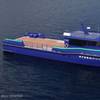Electronic Navigation specialist Maris has launched ‘Zero downtime ECDIS’, a new product support service devised to ensure that, once mandatory, Electronic Chart Display Information Systems are available at all times.
The International Maritime Organization has ruled that mandatory carriage of ECDIS equipment onboard ship will be phased in from July 2012, starting with newly built passenger ships. The move recognises the inherent benefits of ECDIS as a way of improving the safety of navigation, such as its ability to act as a tool for identification and its automatic generation of grounding alerts.
While some ship owners intend to back up ECDIS with up-to-date traditional paper charts, many have accepted that it will be necessary to install dual systems for back up, in case one ECDIS fails.
However, to be allowed to sail in the event of such a failure, even a ship owner pursuing a policy of ECDIS redundancy will have to keep up to date paper charts in reserve.
According to SOLAS V/22, 16.2, while malfunctions will not necessarily make the ship unseaworthy or provide a reason for delaying the ship in ports where repair facilities are not readily available, suitable arrangements must be “made by the Master to take the inoperative equipment or unavailable information into account in planning and executing a safe voyage to a port where repairs can take place”.
The leading Class body commented: “In such cases, a Master may request Class/Flag for permission to sail e.g. to the next port for repair, perhaps carrying some extra paper chart if requested by the Flag. Our experience is that the various Flag States handle such requests somewhat differently.”
The Zero downtime ECDIS concept from Maris has been devised to avoid potential delays. It consists of the offer of a ‘hot or cold spare’ third ECDIS delivered direct to the ship so that it can always proceed to the next port of call, even if up to date paper charts are not available. The defective unit can then be shipped to the manufacturer at the ship owner’s convenience for repair.
Available via subscription, Steinar Gundersen, Maris Deputy Chief Executive (Corporate), said that the new service was part of the supplier’s campaign to support customers, and the phase in of Mandatory ECDIS. “The third ECDIS can either be installed as a ‘hot spare’ online with the dual ECDIS systems or as a ‘cold spare’ supplied as a plug-in unit, which the crew can install. In the case of a cold spare it will come complete with application software, updating all application software, settings and electronic charts and will be self-configured to the exact settings of the ship, drawing on the ship’s remaining ECDIS.”
Gundersen said that the remaining ECDIS could then be packed away and returned to MARIS before going to a warehouse as a 'reconditioned' unit to be sent to a new customer with a similar subscription and the need for a replacement unit.
He said that Zero Downtime ECDIS service would do away with the need for service engineers to fly all over the world to rendezvous with vessels in port. “The potential for delays will be eradicated, but this will also mean that our engineers minimise their carbon footprint. Maris places a high priority on both service and the environmental impact our services make.”













